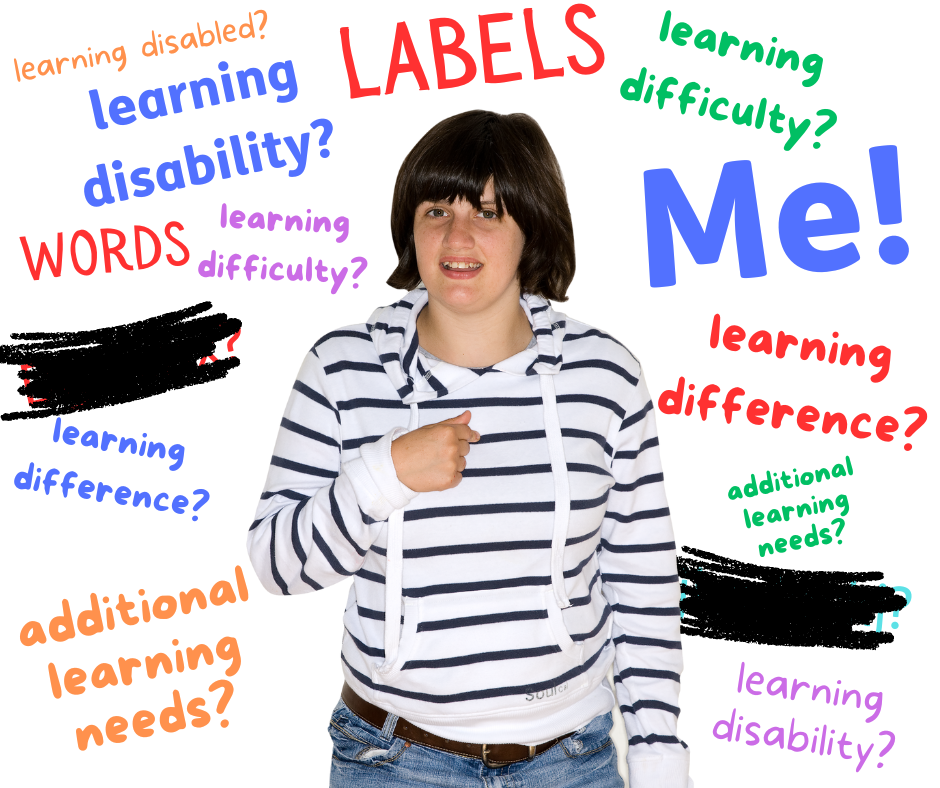 All Wales People First have agreed to carry on using the term ‘people with learning disabilities’. They have written this thought-provoking article about why it is important that people with learning disabilities choose their own labels.
All Wales People First have agreed to carry on using the term ‘people with learning disabilities’. They have written this thought-provoking article about why it is important that people with learning disabilities choose their own labels.
The article was written by Tracey Drew, Membership Engagement Advisor, and is included in the Spring 2023 issue of All Wales People’s First’s Talkback magazine (PDF).
We have invited All Wales People First to publish this important article on our website, while below our CEO Zoe Richards explains why Learning Disability Wales supports the members of All Wales People First in their decision.
“For some time there has been discussion around the label Learning Disability. We acknowledge that it doesn’t sit neatly within the social model of disability. At times we have been challenged by others on our views and our use of the label learning disability. We are not an organisation led by a disabled person and therefore it is important that we take our lead from All Wales People First on this very important issue.
“From the article below you can see the work, thought and emphasis that is placed on understanding and exploring the issue, and Learning Disability Wales thinks it’s important that people with a learning disability lead the way on how they identify, and that Learning Disability Wales adopts and supports that.
“It’s great to share this article written by All Wales People First during Learning Disability week.”
Zoe Richards, CEO, Learning Disability Wales
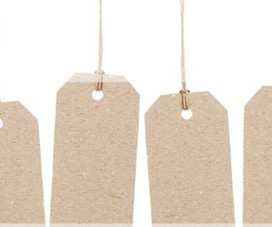
Labels – a necessary evil or empowering banner?
Every few years, All Wales People First asks members what term we should use to describe the thing all members of AWPF have in common. Back in 2018, when we asked last, members chose to keep the label People with Learning Disabilities.
This year we asked National Council Reps what term they would like to use from now on.
Before Reps voted on the decision, Member Engagement Advisor Tracey Drew, talked with Reps about the difficulties with using this term.
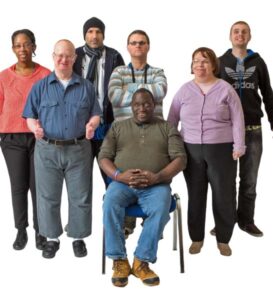
All Wales People First believes that every person experiences their impairment or condition in their own way. It might cause you pain, or frustration or difficulty in doing things by yourself but how you experience these things is unique to you. For example, 2 people may both have Down’s Syndrome but how they experience it will be different.
Your impairment or condition is not what disables you.
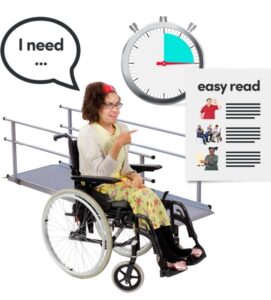
All Wales People First believes that it is the way people are treated or the way society sets things up that disables people. This is called the social model of disability.
For example, you might find it difficult to read because of the way your brain processes information. If a café only has a written menu, you are disabled by the cafe. If the café has a menu with pictures, you are not disabled by the café.
Another example. You use a wheelchair and need a support worker to help you use a toilet. At the shopping centre, there are only male or female toilets that are too small for 2 people. If there was a Changing Places in the shopping centre, you would not be disabled by the shopping centre.
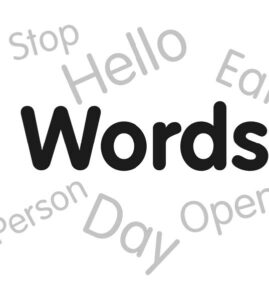
The social model of disability can also be seen in the way words are used.
When we talk about having a disability, people hear that the disability is yours and for you to deal with. This is not social model language because it is not the impairment or condition that disables you, it is the way people treat you.
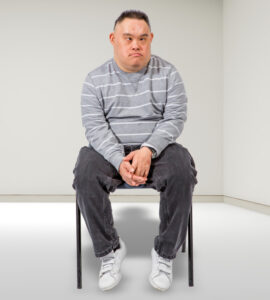
Disability is the way you experience being disabled by others – it is not how your impairment or condition affects you.
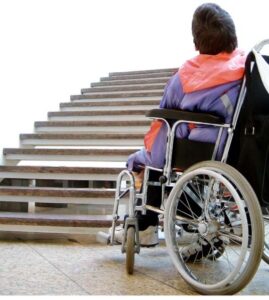
When we talk about society disabling people; it means that society can do something about it. This is social model language.
That doesn’t mean that if society changed everything to be accessible, you would no longer have the condition or impairment, you would. BUT, you would not experience all the barriers that make it harder for you.

The difference in words might not seem that big to you but disabled people have fought for a long time to get the language around disability to change to be more social model.
The wider disabled people movement do not like the term people with learning disabilities. They see the term as not being social model language.
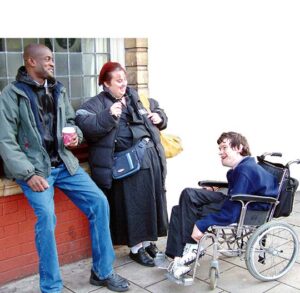
The term learning disability mixes up your impairment with how you experience society disabling you. The term means you are disabled by the difficulty you have learning things. It is not your fault society does not teach you in a way that works for you.
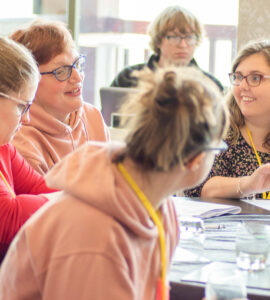
Members of the National Council talked for a long time about these differences in words and how they experience their impairments.
They talked about whether they want to be seen as a person first and their impairment second or whether it’s important to identify proudly as part of a community. Most Reps agreed that it’s important to be seen as a person first. There are still too many times they are not thought about or ignored.
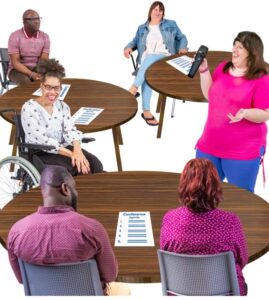
Reps asked questions about the different words and came up with several other terms that could be used instead of people with learning disabilities.
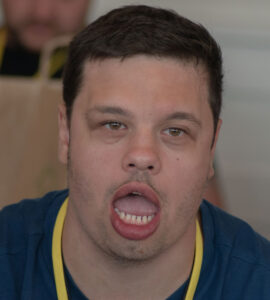
Here are some of the things Reps said:
- “I want something that makes me feel like a normal person.” – Harry
- “I’m autistic. I also consider myself to have learning disabilities. We need a label to help people know who we are.” – Bethan
- “People judge us no matter what label we use” “We need to be valued.” – Sammy
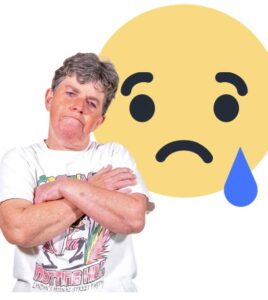
Reps also talked about how language changes. Some of the terms Reps found the most hurtful were terms used in the past, like ‘mental age’.
Reps finally decided on 4 terms and voted.
The 4 terms were:
- Additional learning needs
- People with learning disabilities
- Learning difference
- Learning difficulty
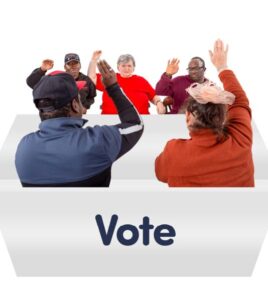
After a very close vote between learning difference and learning disability, Reps chose to continue using people with learning disabilities.
The idea of losing a label that everyone recognises and makes it possible to identify your needs when asking for health or social care services won this time. Reps understood that the term does not fit with the social model of disability but also recognised the importance of choosing your own labels.
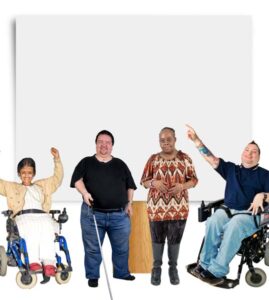
All Wales People First will continue to use the term People with Learning Disabilities until the members decide on a different term.
Tracey Drew – Membership Engagement Advisor, All Wales People First


 >
>
